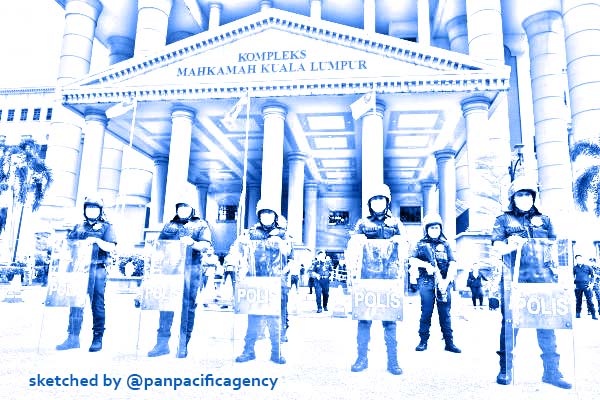Malaysia agrees to abolish mandatory death penalty

Police officers stand guard outside Kuala Lumpur High Court in Kuala Lumpur, Malaysia, 28 July 2020 (Photo: Reuters/Lim Huey Teng). Sketched by the Pan Pacific Agency.
PETALING JAYA, Jun 10, 2022, The Star. The Malaysian government has agreed to abolish the mandatory death penalty with a substitute sentence to be imposed at the discretion of the courts, The Straits Times reported.
The Minister in the Prime Minister’s Department (Parliament and Law), Datuk Seri Dr Wan Junaidi Tuanku Jaafar, said the decision was reached following the presentation of the Report on the Study of Substitute Sentences on Mandatory Death Penalty by him at the Cabinet Meeting on Wednesday (June 8).
“The government has also accepted in principle and taken note of the recommendations of the Special Committee on Substitute Sentences on the Mandatory Death Penalty explained in the report.
“The special committee is headed by former chief justice Tun Richard Malanjum and is comprised of experts in the field of law such as the former chief justice of Malaya, former solicitor general, legal practitioners, law lecturers from leading institutions, and criminologists,” he said in a statement on Friday (June 10).
Dr Wan Junaidi confirmed that the Cabinet has agreed for further scrutiny and study to be carried out on the proposed substitute sentences for 11 offences carrying the mandatory death penalty, one offence under Section 39B of the Dangerous Drugs Act 1952 (Act 234) and 22 offences carrying the death penalty at the discretion of the court.
“A further study will be carried out in collaboration with the Attorney General’s Chambers, the Legal Affairs Division of the Prime Minister’s Department and other interested ministries or departments.
“This action is very significant to ensure that the amendments to the relevant Acts take into account the principles of ‘proportionality’ and the constitutionality of any proposal to the government later.
“The government will also study the feasibility of the direction of the criminal justice system in the country, such as establishing a pre-sentencing procedure, setting up a Sentencing Council, developing Sentencing Guidelines, establishing a Law Commission, prison reform, and imposing sentences based on restorative justice,” he said.
Dr Wan Junaidi said the government’s decision showed its priority was to “protect and guarantee the rights of all parties, which reflected transparency in leadership (towards) improving the country’s dynamic criminal justice system.”
He added that the government also expressed its appreciation for the special committee’s commitment in producing the report, which was the basis for systematic and effective change in the criminal justice system.